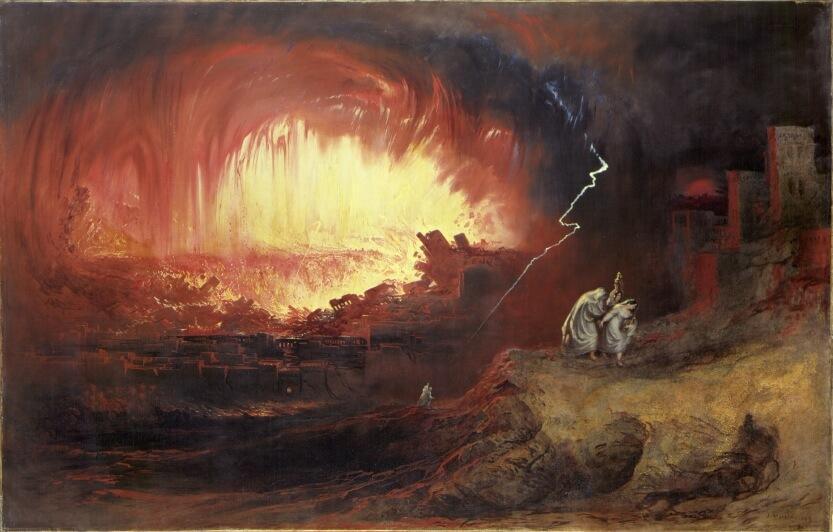Blog Category: Hell (3 posts)
An Examination of Conditional Immortality (Part Two)
Luke J. Wilson | 03rd July 2021 |
Theology
Welcome to Part Two of my study and examination of Conditional Immortality (aka Annihilationism). If you missed part one, you can read that one here.
As with part one, this will be a long post as there is still much ground to cover before we can really grasp the bigger picture about what Scripture teaches. So with that said, I’ll pick right up where we left off. In part one, I covered a lot of New Testament texts, a few Old Testament passages, plus a look at what some of the earliest church leaders also wrote on the topic to the early church. In this one, we will be looking at a few more Old Testament examples and how they relate to the imagery used in Revelation, amongst other things.
Unquenchable Fire and Undying Worms
What of unquenchable fire and undying worms? Do these phrases really mean that the fuel of the fire and the worms must last forever and ever? We have a few references to shed some light on the meaning of these phrases which we can examine below:
Ezekiel 20:46–48Mortal, set your face toward the south, preach against the south, and prophesy against the forest land in the Negeb; say to the forest of the Negeb, Hear the word of the Lord: Thus says the Lord God, I will kindle a fire in you, and it shall devour every green tree in you and every dry tree; the blazing flame shall not be quenched, and all faces from south to north shall be scorched by it. All flesh shall see that I the Lord have kindled it; it shall not be quenched.
So, in our first example, Ezekiel was obviously not prophesying that the forests of Negeb would burn forever and never go out. Instead, fire that “shall not be quenched” is used to mean fire that cannot be interrupted or stopped in its destructive purpose. No one is able to stop a fire like this until it has run its course, or it is stopped by something greater, which is what the word “quench” actually means. It is an action performed by something external which stops the flames — what it doesn’t mean is ...
An Examination of Conditional Immortality (Part One)
Luke J. Wilson | 25th May 2020 |
Theology
I know that "Conditional Immortality" is quite a divisive topic, and one you may have come across before (sometimes referred to as “Annihilationism”); and have been told outright that it’s “heresy” or false, or that it’s an emotional argument people want to believe because it ‘sounds nicer’ than the doctrine of Eternal Conscious Torment (ECT). Or maybe you’ve never even heard of this before and you didn’t realise there were alternative interpretations and views on hell. If you are new to this, in brief it means that “the wicked” will be removed from existence after judgement and finite torment, rather than living forever in torment.
Any discussion on “hell” is going to cover a lot of ground, and refer to many, many places throughout Scripture; so with that said, this will be a long one, so get comfy! I will do this in two parts as it will become too lengthy for one blog post.
This article will just focus on the Scriptural basis for the position of Annihilationism, as opposed to ECT, but to begin with I’ll define some terms as words like “hell” have become quite loaded with extra and unbiblical meaning over the centuries.
What is hell, anyway?
If you read through the Old and New Testament in older translations like the KJV, you’ll see the word “hell” a lot more often than in more recent Bible translations, which will most likely transliterate the Greek words instead. Not all the words get this treatment, and some still get presented as the word hell in English, for example, the NIV and NRSV will convert the word Gehenna into “hell”, but keep the Greek word Hades as-is (see: Matt. 5:22; 11:23).
The etymology of “hell” and its origins and how it became the word we know today in English, would take more time than I have space for here, but in short, there are three main Greek words which often get translated as the word “hell”, even though they are each different words with different underlying meanings:
Gehenn...
Rob Bell's “Love Wins” (Review)
Luke J. Wilson | 05th April 2014 |
Book Film Reviews
Book review on Rob Bell's “Love Wins” (originally written March 2013)
This book was quite openly condemned by some prominent Christian leaders when the book was first announced back around Spring 2011, mainly mainly accusing Bell of being a universalist and denying the existence of hell.
Lots of leaders formed opinions about the book and thus lots and laypeople took on various opinions as their own without much insight or research. The problem was that these leaders hadn't even READ the book! It wasn't released yet at the time. They decided their opinions based on the blurb and promo video which posed provocative questions about the doctrine of hell.
The book starts up asking lots of questions concerning salvation and how are you “attain” it and the consequences if you don't – while the same time pointing out the flaws in modern theology and general beliefs held by many in the Church today.
He then presents a lot more question to get you thinking and quotes Jesus' words, and a few other scriptures, which leads to more questions. Therein lies the purpose of this book – not for Rob to push you to believe what he does, but to get you to question and really think about the things we say we believe.
Bell then moves on to heaven. Unless you've really studied the Bible on Heaven, this chapter will likely smash a lot of cultural ideas you hold without you really realising it – the same can be said about the the chapter after which deals with hell.
Prepare for an eye-opener, and a lot of "Gospel Truth" that has somehow got lost, changed, misrepresented and mixed up in Medieval tradition and imagery over the last few centuries.
Anyone who is aware of the controversy that was/is surrounding this book and who heard that that Rob Bell "doesn't believe in hell" can rest assured that this isn't the case.
To quote the book, Bell writes:
"There is a hell now, and there is a hell later, and Jesus teaches us to take both seriously." (pg. 79)
It's not only t...




